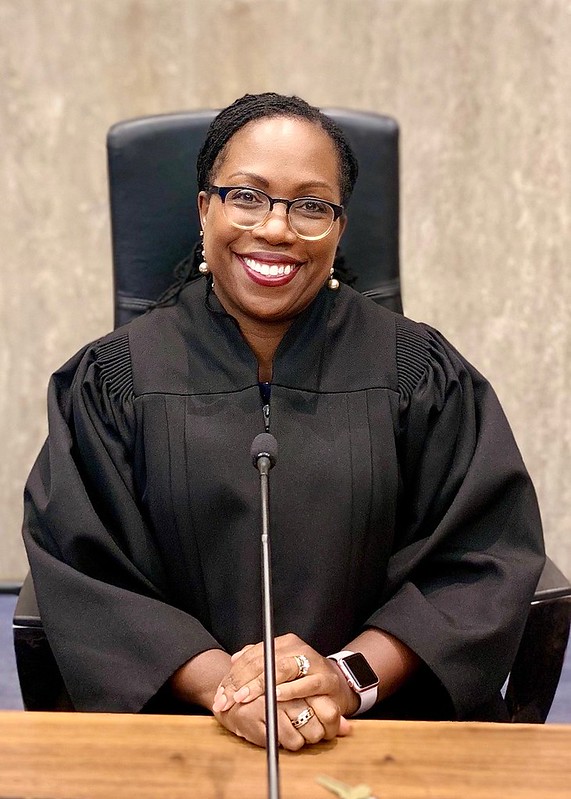‘Can you provide a definition of the word woman?’
Judge Ketanji Brown Jackson never could have expected to be asked that simple question – ‘what a woman is’’ – by Sen. Marsha Blackburn (R-Tenn.) Jackson’s response was by turns puzzled, nervously amused and then lawyerly in saying no. She said she couldn’t define the word without knowing the legal context.
The brief confrontation was one of those moments that can capture the public imagination because suddenly all of the complexities of the Supreme Court are boiled down to one simple question a kindergartner might answer but a brilliant Harvard Law graduate would not. The exchange quickly became big news on Fox and other right-leaning media sites.
What was missing – as it so often is – was context. In this instance the context is the two-century struggle women have fought to try to gain equal rights – to define what woman means. A struggle that includes this confirmation hearing for the first Black woman nominated to the court.
The story of the legal crusade for equal constitutional rights for women runs counter, however, to the Blackburn’s views on women’s equality and counter to the originalism that Republican senators espouse when interpreting the Constitution.
The men who wrote “equal protection” into the Constitution never meant to protect women and the Supreme Court waited a century before striking down a law for violating the “equal protection” of women.
Thomas Jefferson wrote, “all men are created equal.” No one in polite society then thought women’s legal rights to vote or own property or work outside the home should be protected. In fact our national belief in equality didn’t make it into the original Constitution.
In antebellum America the rules of coverture – derived from English common law – gave husbands the rights to a wife’s paid and unpaid labor, most of her property and her obedience. Wives couldn’t sue or make contracts without their husbands’ consents, nor could they vote. In the eyes of the law, the “very being or legal existence of the women is suspended during marriage” wrote William Blackstone, the great 18th century legal commentator.
When women gathered at Seneca Falls in 1848, they wrote their Declaration of Sentiments, patterned on the Declaration of Independence, except they declared “all men and women are created equal.” Instead of laying out King George’s tyrannies, it laid out the tyrannies of men, beginning with the refusal to allow women to vote or have any voice in lawmaking.
It took a Civil War and half a million American deaths to lay the groundwork for the 14th Amendment and “equal protection.” But for a century that didn’t include women.
Equal doesn’t apply to women
The 14th Amendment provided in 1868 that, “No State shall make or enforce any law which shall abridge the privileges or immunities of citizens of the United States” and added, “No State shall…deny to any person within its jurisdiction the equal protection of the laws.”
But when two women – one from Missouri and one from Illinois – went to the Supreme Court to claim the amendment’s protection, they quickly found they were not included.
The Illinois Supreme Court had denied Myra Bradwell the right to practice law solely because she was a woman. Her lawyer in the Supreme Court, Matthew Hale Carpenter, harkened back to the Declaration of Independence saying, “In the pursuit of happiness all vocations, all honors, all positions, are alike open to every one; in protection of these rights all are equal before the law.”
There was no lawyer arguing the other side of the case, but Bradwell lost anyway. As the 1873 opinion put it, “the civil law, as well as nature herself, has always recognized a wide difference in the respective spheres and destinies of man and woman. Man is, or should be, woman’s protector and defender. The natural and proper timidity and delicacy which belongs to the female sex evidently unfits it for many of the occupations of civil life.
“The harmony….(of) the family institution is repugnant to the idea of a woman adopting to a distinct and independent career from that of her husband….The paramount destiny and mission of woman are to fulfill the noble and benign offices of wife and mothers. This is the law of the Creator.”
The next year, the Supreme Court turned away Virginia Minor, who had tried to register to vote in St. Louis in 1872. Chief Justice Morrison Waite, writing for a unanimous court, wrote there was no doubt but that women may be citizens, but there was also no doubt that not all citizens of the United States can vote. It’s up to the states to decide who has that right and Missouri said no.
Even when the Supreme Court seemed to be ruling in favor of women, it did so based on debilitating sex stereotypes. In Muller v. Oregon in 1908, the court upheld a law limiting the workday of women in factories to 10 hours. This came at a time when the court generally ruled that laws limiting the right of contract were unconstitutional under the 14th Amendment. The court justified its ruling in Muelle on the weakness of women.
“That woman’s physical structure and the performance of maternal functions place her at a disadvantage in the struggle for subsistence is obvious. This is especially true when the burdens of motherhood are upon her,…and as healthy mothers are essential to vigorous offspring, the physical well-being of woman becomes an object of public interest and care in order to preserve the strength and vigor of the race.
“Still again, history discloses the fact that woman has always been dependent upon man. He established his control at the outset by superior physical strength…As minors, though not to the same extent, she has been looked upon in the courts as needing especial care that her rights may be preserved.”
Even ‘sprightly’ barmaids may not apply
Even after women narrowly won the right to vote in 1920 with ratification the 19th Amendment, the Supreme Court continued to give women second class status under the Constitution.
As late as 1948, the court upheld a Michigan law that forbade a woman to work as a bartender unless she was the “wife or daughter of the male owner.” Justice Felix Frankfurter jovially noted the “historic calling” of the “alewife sprightly and ribald,” but cautioned that the 14th Amendment “did not tear history up by the roots.” He added that Michigan could “beyond question, forbid all women from working behind a bar….The fact that women may not have achieved the virtues that men have long claimed as their prerogatives and now indulge in vices that men have long practiced, does not preclude the States from drawing a sharp line between the sexes.”
And in 1961 the court upheld a Florida law that excluded women from jury lists unless they requested inclusion, resulting in almost all all-male juries. The court continued to interpret equal protection in light of a woman’s role in the family, just as it had in Bradwell almost a century earlier. A woman, who had been convicted of killing her husband with a baseball bat after he cheated on her, thought women on the jury would better understand her plea of temporary insanity.
But the court said no. “Despite the enlightened emancipation of women from the restrictions and protections of bygone years, and their entry into many parts of community life formerly considered to be reserved to men, woman is still regarded as the center of home and family life.”
Ginsburg vs. Schlafly
In 1964 Congress passed the Civil Rights Act that included sex discrimination as an afterthought. A Southern legislator added sex to the grounds for discrimination, possibly as a poison pill to defeat the entire act. Some members of Congress laughed, but sex was included in the final law.
Still it wasn’t until Ruth Bader Ginsburg brought Reed v. Reed to the Supreme Court in 1971 that the court ruled for the first time that the 14th Amendment’s 103-year-old promise of equal protection could strike down a law that discriminated on the basis of sex.
The next decades were a race between two very different women, Ginsburg and Phyllis Schafly from Alton, Il. Ginsburg was taking case after case to the Supreme Court to provide women with equal rights, while Schlafly was convincing state legislators to kill the Equal Rights Amendment for fear of same-sex bathrooms and women in the military. Both women succeeded. The ERA still is not part of the Constitution, but Ruth Bader Ginsburg won almost complete equality by including women as a “person” deserving “equal protection.”
The pinnacle of Ginsburg’s legal victory was the opinion she wrote for the court throwing out the male-only admission requirement of the Virginia Military Institute, a male bastion.
The language that Blackburn quoted in her confrontation with Jackson was from the VMI case. The quote about the sexes not being “fungible” was not actually Ginsburg’s words but a quote from a prior case.
The senator’s political point was clear, however: Jackson’s inability to define a woman underscores the “dangers of the progressive education.”
“Just last week,” she added, “an entire generation of young girls watched as our taxpayer funded institutions permitted a biological man to compete and beat a biologoical woman in the NCAA,” a reference to Lia Thomas, a champion transgender swimmer on the University of Pennsylvania’s women’s team.
Critics pointed out that Blackburn has a long record of opposing laws that Ginsburg had supported as a lawyer or upheld as a justice. Blackburn voted against the Lilly Ledbetter Fair Pay Act of 2009, the reauthorization of the Violence Against Women Act and opposed ratification of the ERA.
Critics also point out that applying the original meaning of 14th Amendment would not have protected women at all.
Jackson finally found a way not to answer the question. She pointed out that the definition of sex in the law was an issue that is likely to come before the court, so she should not express an opinion.
One interesting footnote is that Justice Neil Gorsuch, one of the most conservative justices on the court, wrote the decision in 2020 holding that the word sex – added as an afterthought to the 1964 Civil Rights Act by a Southern segregationist – includes sexual orientation and gender-identity.
The Senate’s decision whether to confirm Jackson as the first Black female justice is the next signpost on the path toward equality.
William H. Freivogel is publisher of GJR, a professor of media law at Southern Illinois University Carbondale and a member of the Missouri Bar. He covered the Supreme Court as a deputy Washington Bureau Chief for the St. Louis Post-Dispatch.



